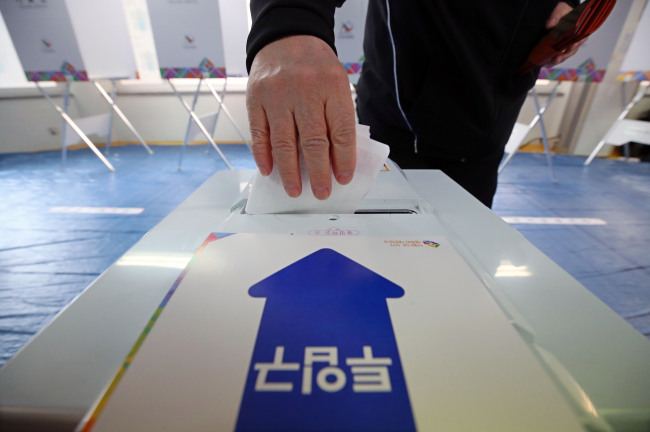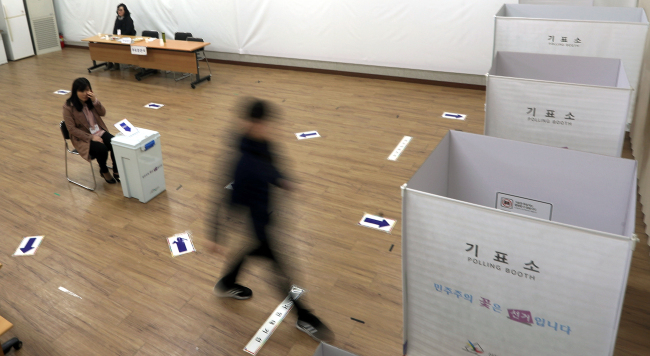South Koreans cast their ballots Wednesday in by-elections to pick two lawmakers and three local councilors in what could be a barometer of public sentiment ahead of next year's general elections
Voting kicked off at 6 a.m. and is to run until 8 p.m. at 151 polling stations in three provinces including South Gyeongsang Province, according to the National Election Commission.
 |
(Yonhap) |
As of 2 p.m., voter turnout for parliamentary by-elections came to 36 percent, according to the watchdog.
The turnout for early voting on Friday and Saturday reached a record-high 14.37 percent. For the parliamentary by-elections, the turnout for advance voting came to 14.71 percent.
The main focus is on who will fill the two parliamentary seats up for grabs in South Gyeongsang Province located in the country's southeastern region.
The constituencies at stake lie in Changwon, 400 kilometers southeast of Seoul, and Tongyeong-Goseong, 450 km southeast of the capital.
Rival parties see the by-elections as a litmus test of voter sentiment in the province ahead of the nationwide parliamentary elections slated for April 2020.
For the ruling Democratic Party, the votes will be a gauge of people's assessment of liberal President Moon Jae-in's performance. Moon, whose presidency has entered its third year, hails from the province.
The elections are seen as a test for the leadership of Hwang Kyo-an, new chairman of the main opposition Liberty Korea Party, as the outcome could affect his status within the party ahead of next year's parliamentary elections.
The province, a manufacturing hub for the auto and shipbuilding industries, is bearing the severe brunt of the economic slowdown.
So the DP focused on promoting its strategy to boost the regional economy while the LKP voiced the need to hold the government accountable for the economic slowdown.
Liberal politicians have received strong voter support in the industrial city of Changwon, as liberal candidates have been selected in three of the four general elections since 2004.
Conservative contenders have held firm in Tongyeong on the southeast coast.
 |
(Yonhap) |
To muster liberal votes, the DP and the leftist Justice Party merged their candidacies last week.
Yeo Young-guk of the minor party secured a single candidacy in the Changwon district. The parliamentary seat has been vacant following the suicide of progressive lawmaker Roh Hoe-chan of the Justice Party.
The move came as the public approval rate for President Moon has recently declined to a record low since he took office in May 2017.
The DP clinched an overwhelming victory in the local elections last June, aided by strong support for Moon and his drive for peace with North Korea.
But the public support rates for the president and the DP were dented by the economic downturn and stalled denuclearization talks between the United States and the North.
Meanwhile, the LKP has eyed the by-elections as a chance to cement its status as the main opposition party that can deter the DP's liberal agenda.
The conservative party suffered a crushing defeat in last year's local elections as it was still reeling from the fallout of the ousting of scandal-ridden former President Park Geun-hye.
But the public support rate for the LKP has recently rebounded to the 30-percent mark for the first time since the corruption scandal involving Park rattled the nation in late 2016.
During campaigning, the LKP highlighted what it calls the liberal government's economic policy failure. Its candidate running in Changwon claimed Moon's nuclear-free policy dented the regional economy in the city, where nuclear energy-related firms are clustered.
The minor opposition Bareunmirae Party has fielded only one candidate in Changwon for the by-elections.
It sought to appeal to voters by stressing its role as an alternative in the current politics dominated by the two major parties, which the party says are engulfed in bickering over ideological divides. (Yonhap)









